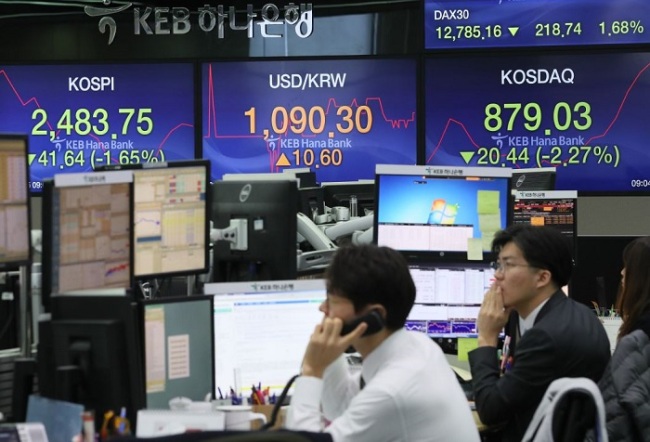Foreign buying of shares traded on the secondary KOSDAQ market in 2017 reached the highest level since the global financial crisis, with their ownership hitting a fresh high, data showed Tuesday.
Offshore investors bought a net 3.14 trillion won ($2.88 billion) worth of shares on the minor bourse last year, the largest since the 2008 worldwide financial debacle, according to the data from the Financial Supervisory Service.
The previous record was set in 2013, when foreigners' net buying came to 1.77 trillion won.
Offshore investors bought a net 3.14 trillion won ($2.88 billion) worth of shares on the minor bourse last year, the largest since the 2008 worldwide financial debacle, according to the data from the Financial Supervisory Service.
The previous record was set in 2013, when foreigners' net buying came to 1.77 trillion won.

Foreign investors' strong net purchases pushed their ownership of KOSDAQ stocks to a new high of 37.3 trillion won as of end-2017, or 13.2 percent of the total market capitalization.
The amount represented a whopping 84.8 percent jump from the previous year, the largest-ever on-year growth rate. It also marked a sharp turnaround from 2016, when their KOSDAQ ownership edged up 0.9 percent from a year earlier.
After posting net selling of 40 billion won in January, offshore investors continued to be net buyers of shares registered on the tech-heavy market for the rest of the year.
However, foreign investors have turned net sellers this year, with their net selling reaching 565.8 billion won as of Monday. Foreigners sold a net 225.5 billion won on Monday alone.
Battered by massive foreign selling, the benchmark index of the KOSDAQ market plunged 4.58 percent Monday, the biggest single day drop in 10 1/2 years.
In addition, foreign investors have been selling stocks on the main KOSPI market, with their net selling reaching around 2 trillion won as of Monday.
Market watchers attributed foreign investors' recent selling of South Korean stocks to surging US interest rates and expectations of faster rate hikes in the world's largest economy.
The US Federal Reserve had originally been expected to raise interest rates three times this year, but expectations of four raises are growing on soaring US Treasury yields and expanding inflationary pressure, they added. (Yonhap)


![[Herald Interview] 'Amid aging population, Korea to invite more young professionals from overseas'](http://res.heraldm.com/phpwas/restmb_idxmake.php?idx=644&simg=/content/image/2024/04/24/20240424050844_0.jpg&u=20240424200058)
















